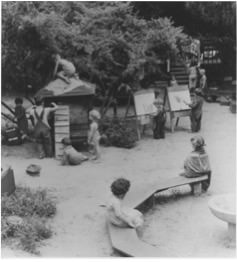History of IHD
 The Institute of Human Development at Berkeley is 89 years young — with a very rich history. It began with a bold initiative in 1927 from the Rockefeller Foundation that established six university-based research institutes (Berkeley, Yale, Minnesota, Iowa, Columbia, Toronto) to study the factors that affect human development from the earliest stages of life. The same grant also led to the creation of the Society for Research in Child Development (SRCD) that now has more than 6,000 members globally. This initiative was the vision of Bearsdley Ruml, who in response to growing concerns about poverty and complex social problems, urged the Foundation to move away from simply providing social welfare and emergency relief, and instead advocated for a radically different approach: to invest in scientific research aimed at understanding the roots of poverty, focusing on child development, and emphasizing the practical applications of that research toward the improvement of social problems through early intervention.
The Institute of Human Development at Berkeley is 89 years young — with a very rich history. It began with a bold initiative in 1927 from the Rockefeller Foundation that established six university-based research institutes (Berkeley, Yale, Minnesota, Iowa, Columbia, Toronto) to study the factors that affect human development from the earliest stages of life. The same grant also led to the creation of the Society for Research in Child Development (SRCD) that now has more than 6,000 members globally. This initiative was the vision of Bearsdley Ruml, who in response to growing concerns about poverty and complex social problems, urged the Foundation to move away from simply providing social welfare and emergency relief, and instead advocated for a radically different approach: to invest in scientific research aimed at understanding the roots of poverty, focusing on child development, and emphasizing the practical applications of that research toward the improvement of social problems through early intervention.
This large grant was crucial in helping to establish IHD as a bold intellectual center — to begin to address questions ranging from genetics to the consequential effects of contexts and institutions on the development of children. Several foundational contributions include: The development of the Bayley Scales of Infant Development by Nancy Bayley, an original member of the research staff of the Institute; some of the earliest pioneering longitudinal studies led by Jack and Jeanne Block, predicting psychological functioning in later life from early competence, socioemotional development, and profiles of personality dispositions; pioneering studies on parenting and adolescent development by Diana Baumrind; foundational studies in emotional development by Joseph Campos; studies on the psychophysiology of stress response in children by Tom Boyce, and pioneering studies on theory of mind and Bayesian models of learning by Alison Gopnik (and many others).
